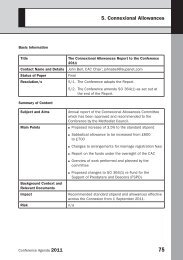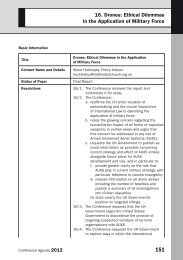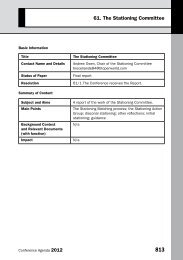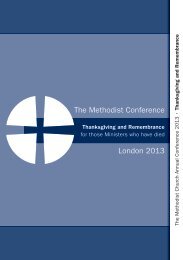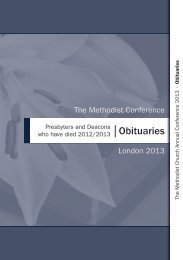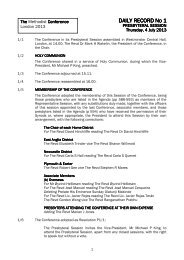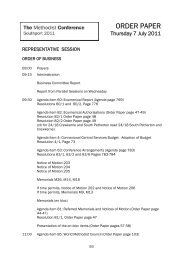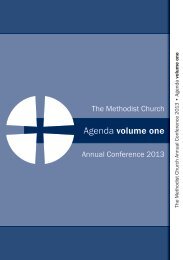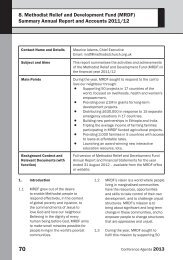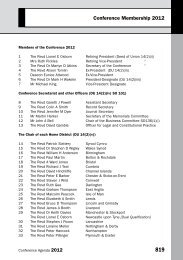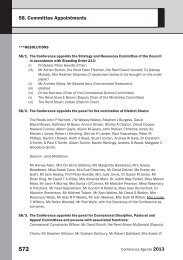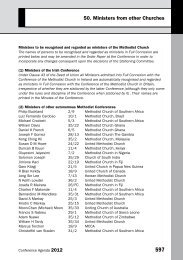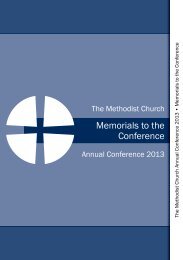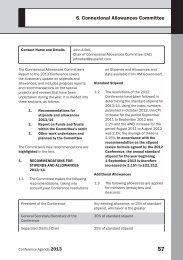Agenda Volume 3 - Methodist Conference
Agenda Volume 3 - Methodist Conference
Agenda Volume 3 - Methodist Conference
Create successful ePaper yourself
Turn your PDF publications into a flip-book with our unique Google optimized e-Paper software.
57. The Fruitful Field Project<br />
is anticipated that student ministers<br />
following the full-time pathway do so<br />
as their primary occupation, while<br />
student ministers following the parttime<br />
pathway are likely to be doing so<br />
alongside other commitments, and<br />
not as their sole undertaking. Student<br />
ministers following the full-time<br />
pathway receive a bursary of around<br />
£12,000 per annum, from which all<br />
maintenance costs must be met,<br />
along with means-tested dependent<br />
child payments where relevant. For<br />
student ministers following the parttime<br />
pathway, travel expenses and<br />
some other expenses incurred during<br />
the course of following the pathway<br />
are reimbursed.<br />
50 All student ministers seek to meet<br />
a common set of competencies<br />
clustered around six headings:<br />
Vocation (call and commitment);<br />
Being in relationship (with God,<br />
self and others); The Church’s<br />
ministry in God’s world; Leadership<br />
and collaboration; Learning and<br />
understanding; Communication.<br />
Although the competencies are<br />
common for all student ministers and<br />
across the ten learning institutions,<br />
the courses and curricula offered<br />
at each institution are different<br />
and designed by the institution<br />
itself. The vast majority of courses<br />
and curricula involve the student<br />
minister working towards a Higher<br />
Education award. The Higher<br />
Education awards are made available<br />
through partnerships negotiated by<br />
each institution. Student ministers<br />
who are judged by the local<br />
and the connexional Oversight<br />
Committees to have met the required<br />
competencies are recommended to<br />
the <strong>Conference</strong> for stationing, usually<br />
as probationers.<br />
51 The 2007 <strong>Conference</strong> decided to plan<br />
to support 120 student ministers<br />
at any one time, half of whom were<br />
projected to follow full-time pathways,<br />
and half to follow part-time pathways.<br />
This projection has proved largely accurate<br />
over the intervening five years.<br />
The pathways for those preparing to<br />
be admitted as Local Preachers and<br />
for those preparing to be appointed<br />
as Worship Leaders<br />
52 Faith & Worship is the standard<br />
course for those preparing to be<br />
Local Preachers: seventeen units<br />
of study, grouped into four sections,<br />
typically tutored in the Circuit.<br />
The course was first published in<br />
1990, and revisions intended to<br />
give another five years’ ’shelf life‘<br />
were phased in from 2001. At this<br />
point examinations were replaced<br />
by submission of exegeses and a<br />
worship portfolio for each section.<br />
Each unit (after the introductory three)<br />
is assessed by written assignment,<br />
marked by a local tutor and submitted<br />
for second marking and moderation<br />
by connexional assessors. A pass<br />
mark of 40% is required for each<br />
piece of work in order to progress.<br />
The Local Preachers’ Meeting has<br />
oversight of the key elements of the<br />
pathway and its progress: providing<br />
a mentor, arranging for service<br />
660 <strong>Conference</strong> <strong>Agenda</strong> 2012



